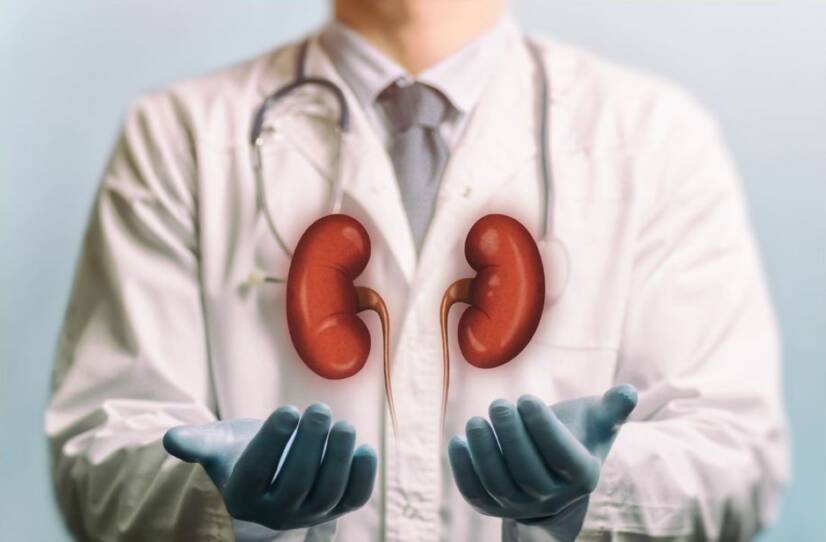- solen.sk - Current possibilities of pharmacotherapy and prevention of lower urinary tract infections, PharmDr. Eva Kráľová, PhD, Department of Pharmacology and Toxicology, Faculty of Pharmacy, Charles University, Bratislava, PharmDr. Ivana Granatierová, Longital Pharmacy, Bratislava
- solen.cz - Management of nursing care in IMC in children, PhDr. Iveta Ondriová, PhD., MUDr. Anna Sinaiová
- solen.sk - Urinary tract infections in children
- fmed.uniba.sk - GENERAL UROLOGY FOR MEDICINE, Juraj Filloa Ján Breza Jr.
Kidney diseases: from inflammation to stones to failure? And their symptoms

Kidneys, like other organs of the human body, are very important for its functioning. But what does it cause when their functionality is disturbed?
Article content
Kidney diseases range from inflammation, to stones, to renal failure. What is their basis? How do they manifest themselves and what symptoms to watch out for?
You often want to know:
Where do the kidneys hurt, or how does only one kidney hurt?
How to strengthen, cleanse and regenerate them?
What are the symptoms of kidney failure?
+ Basic information about the function of the kidneys in the body.
Many people don't even realize how important the kidneys are to our body. If their proper functioning is disrupted, it can have bad consequences for the body.
The kidneys and their function in the body
The kidney is a paired organ. This means that we have one pair of them in the body. They are located on the sides of the lumbar spine in the back of the abdominal cavity.
It is bean-shaped and approximately 12 cm in height and 6 cm in width. Its thickness is about 3 cm. The right kidney tends to be smaller and lower than the left.
It is made up of two layers. The pith and the cortex. The pith is the inner part of the kidney and the cortex is around the kidney. All of this is encased in the kidney capsule. There is also a layer of fat on top to protect it.
Functions of the kidney and how does it work?
They serve to filter the blood and regulate the amount of water and salt in the human body. Their equally important function is elimination, that is, the removal of unwanted products of metabolism from the body. They are involved in the regulation of blood pressure, acid-base balance and blood formation in the body.
Acid-base balance is the ratio between the supply and excretion of acids and bases in the human body.
Read more about acid-base balance in our magazine article.
What are the symptoms of kidney failure?
Kidney failure is the loss of the kidneys' ability to excrete waste substances from the body. It is also when they do not have the ability to maintain the stability of the internal environment. Blood filtration is then insufficient, urine stops forming and metabolic wastes accumulate in the body. The body begins to overproduce and can have fatal consequences.
Kidney failure is a life-threatening condition. A distinction is made between acute and chronic kidney failure.
Acute renal failure
It is a sudden and rapid failure that can have fatal consequences within a few days. The causes of such failure are most often:
- Dehydration
- intoxication with various substances, including drugs
- kidney failure (caused by injury or disease)
- acute inflammation of the kidneys
- urine not draining due to an obstruction
Symptoms typical of acute renal failure are cessation of urine production (so-called anuria), swelling of the whole body, nausea to vomiting, headache, disturbances of consciousness.
The treatment must be immediate. It consists of eliminating the cause or treating it. It is important to maintain the body's hydration at an adequate level. It is also important to maintain the stability of the body's internal environment.
The kidneys are able to return to normal function within a few days. Should they fail to do so, haemodialysis is necessary. This involves artificial filtration of the patient's blood.
Chronic renal failure
This is basically a gradual and long-term failure. It can last for several years. In most cases, chronic kidney failure causes:
- chronic inflammation
- secondary to other diseases such as diabetes or high blood pressure
- congenital diseases
- systemic connective tissue diseases
Symptoms are often less pronounced. Therefore, a person may overlook them at first. They may be fatigue or general weakness. They are also symptoms of the absence of hormones that are produced in the kidneys. For example, erythropoietin, which stimulates the production of red blood cells.
On average, one in ten people on our planet suffers from chronic kidney failure.
To slow down the progression of chronic kidney failure, it is necessary to follow a diet, a proper lifestyle and treatment prescribed by a doctor. When the condition worsens to an extreme stage, dialysis or even a kidney transplant is necessary.
Haemodialysis
It is the removal of excessive amounts of water, waste substances and minerals from the blood of the affected person. It is carried out by filtering the blood through a semi-permeable membrane in a special machine. It is carried out acutely or regularly in patients with chronic kidney failure. It is carried out in a dialysis centre.
The table below shows kidney function and risk factors that influence kidney failure
| Kidney function | Risk factors |
|
|
In terms of risk factors, the focus should be on prevention. This can be divided into primary and secondary prevention. Primary prevention is about removing or eliminating risks that can cause kidney disease. Secondary prevention is about acting on factors that can exacerbate existing kidney disease.
In extreme cases, even one kidney is sufficient to provide the functions that the kidneys perform in the body.
Kidney diseases and their development
The kidneys hurt in the sacral region of the back. This is the section above the sacrum and below the rib cage. It is for this location that they can mimic (feign) back pain.
They can hurt bilaterally, but also only on one side. An example of transverse kidney pain on one side is inflammation or a kidney stone.
There are many causes of the problem...
Some, such as ethnicity, age, gender or heredity, cannot be influenced. Others, such as poor lifestyle, smoking, drinking alcohol, being overweight, can be influenced.
Kidney diseases can be inflammatory or non-inflammatory.
Inflammatory diseases are infectious or non-infectious. Infectious diseases are caused by microorganisms, such as viruses, or bacteria. Non-infectious diseases are caused, for example, immunologically or by chemicals, which include drugs. In particular, excessive amounts of analgesics, which are painkillers.
Non-inflammatory diseases are caused by various consequences of injuries and external damage or the formation of kidney stones.
Even kidney diseases are divided into acute and chronic.
Acute ones arise quickly. As a rule, they take a few hours to days. They are often caused by the progression of urinary tract diseases, inflammation of the bladder, prostate and so on. Or they are so-called renal colics caused by kidney stones.
Chronic diseases are those that have a duration of more than 3 months. They may be prolongations of acute diseases. In some cases, they are diseases that have appeared chronic from the beginning of their onset. These are, for example, chronic inflammations or metabolic diseases.
Kidney stones
Kidney stones (nephrolithiasis) are a disease in which crystalline clumps (stones) form in the ureters or are passed into them from the kidneys. They are formed from minerals found in the urine. They can descend as far down as the bladder.
Kidney stones are usually flushed out of the body in the urine. They do not cause any problems.
Renal colic
It is more or less a symptom that alerts to the presence of kidney stones in the ureter. If these have become so large that they are unable to pass into the bladder, and clog the ureter.
The ureter and renal pelvis spasm. This is the part of the kidney where the urine concentrates before entering the ureter. As it then tries to move the stone, spasms occur.
This causes pain, mainly localised in the flank, lower abdomen and groin area. There may be an associated feeling of retching or vomiting. In some cases, there may also be blood in the urine from damage to the urinary tract from the stone. However, it is often only detectable microscopically.
Kidney stones can be confirmed by radiological examination, for example by ultrasonography.
Read more about the treatment of kidney stones in our article.
Glomerulonephritis
Is the name given to the inflammation of the glomeruli. They are the main formations of blood vessels in the kidneys, concentrated in clusters, in which blood filtration and urine production take place.
Inflammation of the glomeruli is primary or secondary. Primary glomerulitis arises from direct involvement of the glomeruli. Secondary glomerulitis arises as a complication of another disease.
Symptoms tend to vary:
- subjectively described dull pain in the sacral region
- reduced urine volume, which may also contain blood
- weakness and inappetence
- swelling of the shin and face
It can be caused by bacteria, viruses, chemicals or physical influences.
Treatment usually lasts up to three weeks. Bed rest and diet are needed. Fluid intake depends on the amount excreted. Antibiotics are given for bacterial inflammation.
Pyelonephritis
It is an inflammation of the renal pelvis or renal parenchyma. It is where the kidney joins the ureter. The parenchyma is actually the tissue of the kidney itself.
Most of the time, the trigger is bacteria that are spread through the blood. Other times, the inflammation can occur secondary to, for example, bladder inflammation.
Clinical manifestations depend on the age of the patient. Especially in younger children, they may be less characteristic. Usually pyelonephritis manifests itself:
- pain in the lumbar region of the back, bilaterally or unilaterally
- pain passing into the lower abdomen or groin
- increased body temperature
- headache
- vomiting
- cloudy urine
- blood in the urine
Not all of these symptoms need to be present to diagnose pyelonephritis.
Treatment is by bed rest, taking antibiotics and adequate fluid intake.
Polycystic kidneys
This is a disease in which cysts are found in the parenchyma of the kidney. Their presence in the tissue of the kidney results in a loss of functional parenchyma. This results in a reduction in its function and even failure.
This is a congenital disease, the symptoms of which appear in the form of:
- abdominal pain
- pain in the lumbar region
- blood in the urine
- kidney stones
- high blood pressure
- urinary tract infections
- gradual deterioration of kidney function
Basically, there is no treatment for the cause that causes it. Practically, it treats its symptoms such as high blood pressure, urinary tract infection or kidney failure. The disease itself is an indication for kidney transplantation.
Ischaemic nephropathy
This is a kidney disease in which the arteries of the kidney narrow. This prevents sufficient blood from reaching the kidney and causes the kidney to become bloody, i.e. ischaemic = kidney infarction.
It is most often caused by atherosclerosis. It is manifested by high blood pressure that is difficult to control. Gradually, impaired kidney function develops, leading to kidney failure.
Kidney failure, or the lack of kidney function resulting from this disease, is one of the few things that can be reversed. This is done by inserting a so-called stent. This newly dilates the narrowed renal artery so that blood can flow fully through it again.
And you can find out how to take care of your kidneys responsibly and protect them in this article:
Kidney care: How to regenerate and strengthen them
Interesting resources










